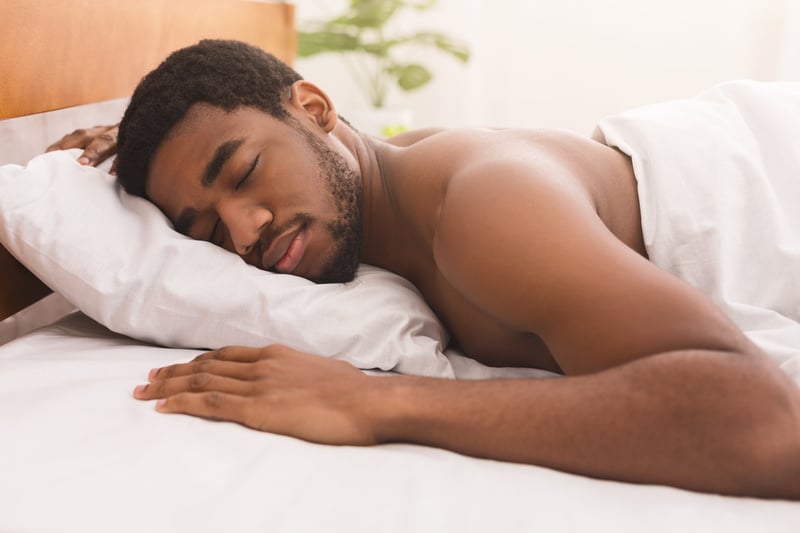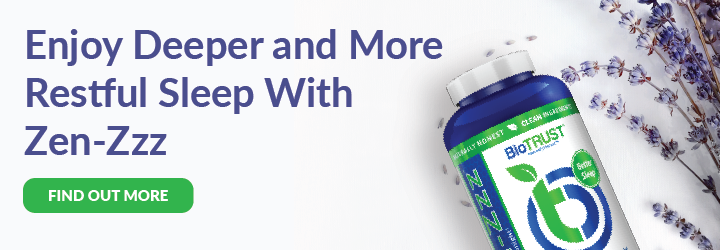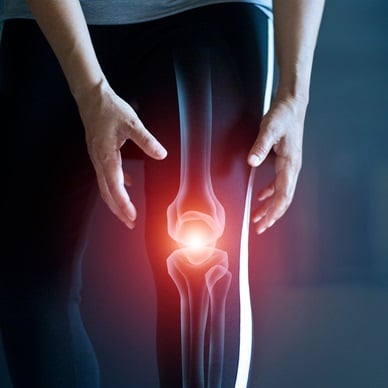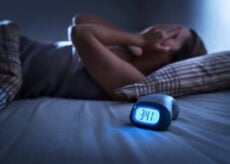See All the Pros and Cons of Sleeping Naked

In the heat of the summer, we’re often looking for ways to cool off, and one of the easiest ways is to shed layers. If you’re a hot sleeper, you likely shed any winter flannels long ago to sleep in something lighter and cooler. But are there any benefits to taking it all off? In other words, can sleeping naked offer benefits?
Indeed, there are benefits to being nude beneath the sheets or just wearing the bare minimum. But there can also be some drawbacks. There’s one big caveat, though: there’s not a whole lot of research on sleeping naked vs. wearing PJs.
That said, there are experts in the sleep sciences who suggest that sleeping naked has benefits worth noting. Here are the reported pros and cons of sleeping naked…
The Pros of Sleeping Naked
1. Easier to Regulate Temperature
Perhaps the biggest benefit of sleeping naked is how much easier it is to regulate body temperature throughout the night—as long as you have blankets to get under if you get cold. Research has found that a comfortable yet cooler temperature can drastically help support sleep quality.
In other words, lowering body temperature as you sleep (without getting too cold) has been shown to both help you fall asleep faster and decrease the number of times you wake up throughout the night. 1 – 3 What’s more, according to animal studies, bodies that are cooler may also burn more fat and are more sensitive to insulin, which could lead to improved weight-loss results. 4
2. Maintain Circadian Rhythm
In evolutionary terms, humans slept sans clothing since the beginning, and some suggest sleeping naked is the most natural state. As such, it’s believed to help the body enjoy natural sleep and waking cycles, which can affect circadian rhythm and potentially boost deeper, more restful sleep. 5
3. Increase Air Flow “Down There”
There’s one part of a lady’s body that needs to breathe but often doesn’t get the chance. Often covered up by various non-breathable, synthetic fabric, too-tight panties or underwear, pantyhose or tights, spanx or leggings, or activewear of all kinds can trap in heat and moisture, which can allow yeast to thrive. Yeast infections are caused by an overgrowth of Candida, which can lead to inflammation of the membranes in the vaginal area, leading to pain, itching, and discomfort. Other types of bacteria can also find warm, damp areas very inviting, leading to similar discomfort.
Before hitting the sack at night, this may be one of the best reasons to strip off any clothing, leave your bottom half bare, or at the very least, sleep in loose, breathable drawers, shorts, or PJs.
That said, for women who are prone to yeast infections or other bacterial infections down below, there’s no research showing that sleeping naked is the cure you’ve been looking for. It could help. But, more proven methods include getting rid of synthetic underwear and instead choosing breathable cotton or other natural fibers and working with your healthcare provider to help determine the cause and, thus, the right solution for you.
4. Give “the Boys” Room to Breathe
It’s also important for the guys to shed tight-fitting underwear. In fact, choosing boxers over briefs has been shown to increase sperm count by 17% and sperm concentration by 25% by decreasing the heat stress on the testicles. 6, 7 Keeping your cool at night can also help improve sperm health and motility. 8 So, if you are hoping for a child in your near future, sleep naked or, at the very least, switch to something loose, so the boys have room to move around, relax, and breathe.
Even if baby making isn’t on your mind, the increased airflow could help decrease chafing and overgrowth of bacteria that can lead to itching or discomfort.
BREAKING: Forget Taking Collagen, Try This 21-Second Trick for Healthier Skin & Hair Instead
5. Promote Your Sex Life
Let’s face it: it just feels more sensual to get between the sheets with nothing on. Sex experts suggest that when folks are naked, they’re more receptive to physical touch and pleasure. We spend most of our lives keeping ourselves covered up, so getting naked can help change how we feel about our bodies, increasing vulnerability and thus intimacy.
Who knows, this may even help improve relationships as 42% of women and 54% of men are reportedly unhappy with their sex lives, which is often simply due to lack of frequency.
6. Improve Relationships
Feeling connected with your partner goes beyond just sex, though. And sleeping next to each other naked may help increase connection and intimacy, with or without intercourse. Research has, for example, found that skin-to-skin contact can lead to decreased stress and anxiety. This type of contact also increases the release of oxytocin, the feel-good hormone that promotes feelings of safety and connection and help you better bond with your partner. 9 – 11
Being naked around others (or just in general) has also been found in research to help increase self-esteem and help you appreciate your body more. Research has shown that the more you see your own body, the more comfortable you may become with it and see how normal and beautiful you are—just as you are. 12
Because sleeping naked with your partner may help improve your body image, that could also have positive effects on your relationship, happiness, well-being, and even sexual functioning.
Just because sleeping naked works for some couples, though, doesn’t mean it’s right for you. Communicate with your partner about your comfort levels with sleeping sans clothing and what feels most natural for you.
7. Promote Younger-Looking Sleep
This benefit is mostly theoretical. For example, if you sleep better when naked, then you can benefit from more quality sleep, which is vital to healthy, younger-looking skin. If you’re well-rested, your skin is less susceptible to swelling, wrinkles, and dark circles. Some people have also suggested that you’re less likely to have fabric folding under the skin, which could help prevent wrinkles. That said, there is no scientific evidence yet that sleeping naked benefits the skin in this way. Again, though, if you do find you sleep better when naked, then more or better sleep can help your skin recover and heal.
The skin also needs to breathe, so if you do find you’re mostly clad in synthetic or constrictive fabrics, then baring it all from time to time or changing into looser-fitting, more natural fibers could help—a lot.
Finally, for people who have inflammatory skin conditions (such as psoriasis or eczema), sleeping naked may be less irritating to the sensitive skin and give it a break from clothing that tends to irritate the tender flesh.
8. Be More Comfortable
Another common reason to remove clothing before bed is just to be more comfortable. There’s nothing bunching around the waist, trapping the thighs, getting tangled in the sheets, or constricting any part of the body. Sleeping nude can feel freeing and more comfortable.
Should you sleep naked? Many of the benefits of sleeping naked depend greatly on your current lifestyle, environment, and preferences. For example, if you have children, pets, or roommates, or if you occasionally find yourself having to get up in the middle of the night due to late-night bathroom runs or being on-call for emergencies or because you live in an area with more frequent earthquakes, you may find it more difficult to sleep naked.
So, these benefits really depend on the person and the situation and is far from set in stone. And, there are also a few drawbacks to sleeping naked.
The Cons of Sleeping Naked
1. Dirty Sheets
Our bodies shed skin, bacteria, and more, and without PJ’s between you and your sheets, staying on top of your cleaning routine becomes that much more important. Our bodies sweat, shed cells, dirt, and oil as we sleep, which can provide a buffet for dust mites.
What’s more, humans pass gas up to 25 times per day, and with that gas can come other particles. Without underwear or PJs to catch those particles, they’re likely to land on the sheets, making them less hygienic. In other words, if you are going bare, don’t skip laundry day and make sure you also use a quality mattress pad to keep your bed clean and help prevent breakouts and other hygiene issues.
2. Allergic Reactions
For people with sensitive skin, when naked, your entire body becomes more exposed to potential allergens found in bedding. That can be pollen from an open window, mold, mildew, pet dander, or even dust mites. Keeping on top of laundry with a non-allergenic laundry detergent may help. Otherwise, protecting the skin with an extra layer might work better for your skin.
3. Sleeping Cold
While you may feel completely comfortable sleeping naked in the heat of the summer, once fall and winter hit, you may risk decreasing your body temperature too much, which can make it harder to sleep and also potentially weaken the immune system. That could lead to more winter colds and infections. If you do want to sleep naked, make sure you have nice, warm bedding or someone to cuddle up with to keep you warm. Or, choose to add an extra layer of cozy PJs for those long, cold winter nights.
4. Late-Night Encounters
For those who have roommates, children, or when guests are visiting, if you try to sneak into the bathroom late at night, you could experience an unintended embarrassing moment. This is especially true for sleepwalkers or folks who get up during the night and don’t remember it the next day.
5. Dealing with Emergencies
They’re called emergencies because they are never expected. If you sleep in the nude, you have one additional (though admittedly small) issue to deal with if you have a sick kid, pet, or partner, or if you need to scramble down the fire escape or out on the street due to a fire, earthquake, or other natural disaster. (It’s a good idea to keep a robe right next to the bed to avoid accidently exposing yourself.)
Should You Sleep Naked?
The biggest consideration for sleeping naked is your personal preference. Do you feel comfortable, sensual even, when there’s nothing between you and the sheets? Or, do you sleep more comfortably with a secure layer between you and the rest of the world?
If you do decide that sleeping naked is what works best for you, then you may want to:
- Shower or bathe before you go to bed.
- Get an extra set or two of sheets, so you can change them more often—at least weekly. Choose higher quality, softer, breathable bedding and sheets that are comfortable against your bare skin. Breathable cotton, Tencel, silk, or bamboo are all good options.
- Ensure you have comfortable bedding, including warm blankets, so you don’t get too cold.
- Make sure you feel comfortable in your surroundings. For example, if you have roommates or family members you don’t want to see you naked, secure your doors (i.e., hit the lock) before going to sleep. And let your partner know you’re sleeping with fewer (or no) clothing, and perhaps invite them to join you.
- Keep a robe near the bed, so you can easily don something in a hurry.
- Give your pets their own beds to sleep in, rather than sharing yours.
You can also ease into sleeping with less clothing as you adjust, and only go at a pace that’s comfortable for you. If you choose not to sleep in the nude, you can also simply choose to wear PJ’s made with more natural fibers instead, such as those made from silk, wool, or cotton. Wool, for instance, has been shown in research to help some people fall asleep faster, compared to cotton or polyester sleepwear, especially for people who have a tougher time falling asleep. 13
At the end of the day, whether you choose to sleep fully clothed or completely naked—or both, depending on the situation, the season, or how you feel—remember to practice healthy sleep hygiene as getting a good night’s sleep is one of the absolute best things you can do for your health! It can help you better manage stress, improve focus, boost performance and mood, and improve just about all aspects of your life.





 US Doctor: "Eating This Every Day Can Snap You Into Ketosis"
US Doctor: "Eating This Every Day Can Snap You Into Ketosis" 3 Key Nutrients to Help Lubricate Your "Tin Man" Joints
3 Key Nutrients to Help Lubricate Your "Tin Man" Joints AVOID Plant-Based Protein Powders (unless...)
AVOID Plant-Based Protein Powders (unless...)

